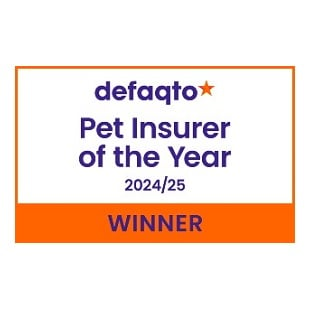We understand that some people are finding it hard to cope with finances at the moment, but please be reassured, we're here to help.
Defacto Pet Insurer of the Year 2024/25
For over 25 years’, we've been dedicated to providing UK owners with unique pet insurance cover, and now, our policies and customer service have won us Defaqto's Pet Insurer of the Year 2024/25 award!
It's not just due to our range of pet insurance policies on offer, our other benefits include:
- The power to choose your excess, to help manage your budget.
- Easy to understand and clear policies.
- Effortless claims - your vet can submit your claim and we'll pay them directly.
- An online account to help manage your policy and claims
on the go. - Access to exclusive discounts and offers through our Treat Tin
And that's not all! Every Animal Friends policy helps make a difference to vulnerable pets and wildlife around the world!

What does Animal Friends pet insurance cover?
Our range of pet insurance policies give you the power to choose the type and level of cover that's right for your pet's needs and your budget. Plus many more benefits:
Vet fee cover from £1,000 to £18,000 - Choose a level of vet fee cover to suit your needs and budget.
Free online vet support - Dog and cat customers can call on a vet or vet nurse at any time of the day or night, any day of the year.
Public Liability - Some of our pet insurance policies provide cover in the event your pet injures someone or damages their property.
Missing or stolen pet - Some of our pet insurance policies can help towards the cost of finding your dog or cat if they're stolen or go missing.
Behavioural therapy - Our Prestige, Lifetime £10,000 and £18,000 policies cover behavioural therapy, including training to address behavioural issues like separation anxiety.
All our pet insurance policies are subject to Terms and Conditions - please read them carefully to understand what you're covered for.

Animal Friends pet insurance FAQs
Your puppy or kitten must be at least 4 weeks old and must live with the policyholder to be insured.
Yes, we can insure senior pets.
To help us keep premiums as low as possible, when your dog turns 8 years of age, or your cat turns 10 years of age, a co-payment will apply to your policy from your next renewal date (or at the point of taking the policy out, if they have already reached that age).
The co-payment is 20% and is paid by you each time you make a claim in addition to your excess. Full details can be found in your Policy Schedule and in your online account.
To find out which breeds are excluded, please visit our lists of excluded breeds for cat policies and dog policies.
We don’t cover any accident or injury that happens within the first 2 days of your policy start date, or any illness within the first 14 days. We also don’t cover any claims involving cruciate ligaments for the first 14 days.
Pre-existing conditions aren't covered by our policies.
Our Lifetime £5,000 and Prestige policies provide cover for dental accidents.
Our Lifetime £10,000 and Lifetime £18,000 provide cover for dental accidents and illnesses.
Policy terms & conditions apply.
Routine treatments, like vaccinations, are not covered by your pet insurance policy.
Yes, all of our policies cover complementary treatments including physio, as long as they’re recommended by a vet.
Terms & conditions apply, see cover levels in Policy Booklets.
We’ll only cover complementary treatments that are performed by a qualified specialist and recommended by a vet. Learn more about our complementary therapy cover.
We understand making a claim can be a stressful time, that’s why we’ve made it as easy as possible for you. We are able to pay your vet directly when you claim.
However, if your vet would rather you pay for the claim, you will need to pay your vet first and then submit your claim to us. In these circumstances, if we accept your claim we will pay you directly.
While setting up your pet’s policy, you can select the excess you will need to pay if you make a vet fee claim.
Our policies have five vet fee excess options for you to choose from: £69, £99, £159, £199 and £249.
You can increase your excess at any time, though you can only decrease your excess at renewal.
You can pay premiums annually or monthly. It doesn’t cost more if you choose to pay monthly by Direct Debit.

What is Pet Insurance?
New to pet insurance? Read our FAQs to find answers to some of the common questions about pet insurance; what it is, the different types available, costs and how to compare policies from different providers to get the best policy for you.
Every pet insurance policy will include a level of cover to help support with vet treatment and medication – this is the foundation of all pet insurance.
Depending on the insurer and the policy, the cover available for vet bills may come with additional benefits, such as access to supplementary services like free vet video consultations, or flea and tick treatments. They may also provide extra assistance in specific circumstances, like Third Party liability cover, complementary therapies, or help towards advertising and rewards costs should your pet go missing.
The treatments you can claim for, how much you can claim, and anything not covered by your policy is detailed in your chosen policy’s Terms and Conditions.
This is why it’s important to make sure you read your policy Terms and Conditions when you buy insurance.
Pet insurance is there to help protect you against unexpected costs related to your pet, such as vet bills if your pet falls ill or gets injured and needs treatment. But pet insurance can also have additional benefits, such as cover when your pet dies or is put to sleep, or if they injure someone or damage their property.
Many pet insurance providers will offer different types of policies, sometimes with a range of cover, allowing customers to select the level of cover that suits their needs and their budget.
Pet insurance prices typically depend on the type of policy and level of cover chosen, along with the breed, location, age, and a number of other factors. Most UK pet insurers allow customers to pay annually or monthly to help spread the cost, and can also provide vet bill payments directly to the vet practice for eligible claims.
There are four types of pet insurance policies you can choose from, these are:
- Accident Only – protects your pet only in the event of an accident; does not include cover for illnesses.
- Time Limited – covers each new condition for 12 months, from the date your pet first shows signs or symptoms, or until you reach your cover limit* – after which, you will not be able to claim for that condition again.
- Max Benefit – provides a set amount of cover for each condition, with no time limit as to how long you can claim while the policy remains active. Once the cover limit* is reached, you will not be able to claim for that condition again.
- Lifetime – includes cover for long-term, chronic, or recurring conditions as well as short-term illness and injury, if the policy is renewed every year.
* "cover limit" means vet fee limit.
For policies such as Time Limited, Max Benefit and Lifetime, a pet insurance provider may also offer different levels of vet fee cover to choose from too. The level of cover you choose should be based on your and your pet’s needs.
All pet insurance policies are subject to Terms and Conditions – it is very important to read them carefully to understand what you're covered for.
It should be noted that not all pet insurance providers will offer all four types of cover.
The “best” policy will look different for everyone, as it will depend on both your pet and your unique circumstances. For instance, certain breeds are more prone to suffering from some health conditions than others – which will need to be considered when you’re searching for your ideal insurance policy.
Additionally, you’re the best person to know whether you can afford to cover unexpected vet bills.
To find the most appropriate level of insurance for your pet (and your pocket!), you’ll need to research the options available from a range of companies.
Insurance companies in the UK are legally obligated to understand and assess your needs and then present you with policies and cover levels that will meet these needs. To do this, they ask you questions about your pet and your circumstances, in order to present you with the most suitable insurance product(s) they offer along with the price.
This means it’s important to answer the questions accurately and truthfully when requesting a pet insurance quote.
Top tip: While looking for the pet insurance policy that’s right for you, check the benefits available as some of these may provide extra services that could help with pet care issues such as free vet video consultations.
The price of pet insurance will depend on a number of things, including:
- Your pet’s age.
- Your pet’s breed.
- Your pet’s gender.
- Your pet’s claims history.
- Your location.
- Veterinary care costs in your area.
- Type of insurance policy you choose.
So, your individual circumstances, along with your choice of policy will have an impact on the cost of your pet insurance.
Some providers offer ways in which you can adjust the cost of your insurance by making changes to either your policy type, cover level, excess level or payment frequency. Additionally, if optional benefits are also available these can be adjusted to help manage the cost of your policy.
We all know that pets are part of the family, and we want the best for them. But like most family members, they too can sometimes be unpredictable. Being prepared for any potential health issue or injury, can help take away a lot of concern and worry.
It is also worth noting that as a pet owner in the UK, you are legally responsible for your pet’s welfare – and one of those responsibilities involves protecting your pet from, and treating them for, illness and injury. This means that if your pet ever needs treatment for an illness or injury, you must pay for that treatment.
Some pet owners may have enough money set aside in the event that the worst were to happen (this is known as “self-insurance”), but this isn’t the case for everyone. Additionally, even those who self-insure may find themselves at financial risk if their pet gets ill or injured before they’ve had time to save enough money, and/or find that the treatment costs are more than they have available.
So, this is where pet insurance can be beneficial - having a pet insurance policy in place can help make sure your pet receives the treatment they need, when they need it, to restore their health without breaking the bank.
Every pet insurer will price their policies differently, which is why it’s important to do your research before you buy. Typically, pet insurance renewal prices are based on a combination of things that don’t change, and things that do change – all of these will impact the cost of your policy each year .
Things that don’t change include your pet’s breed, gender and purchase cost, and the policy you selected. Things that do change include your pet’s age, your location (if you have moved), vet treatment costs, and claims.
The Association of British Insurers reported that the number of pet insurance claims handled during 2023 were 32% higher than the previous year. With the cost of vet treatment also rising too with the advancement of medication and technology, this can also be factored into renewal prices.
The Association of British Insurers states “Claims can significantly impact the renewal premium so it is important that you understand your pet’s breed, the type of common issues it has, what they could potentially cost and include this in any decision you make on pet insurance.”









